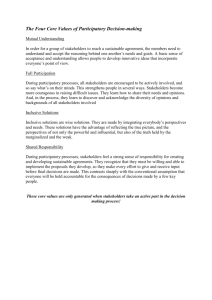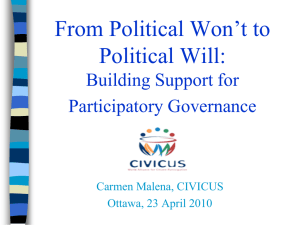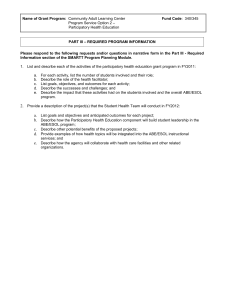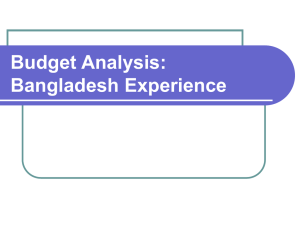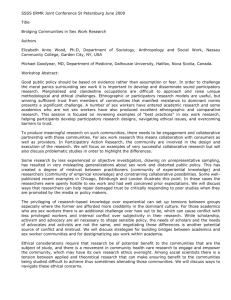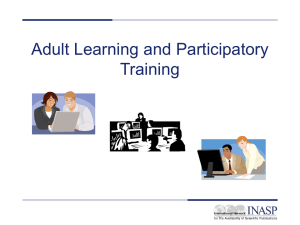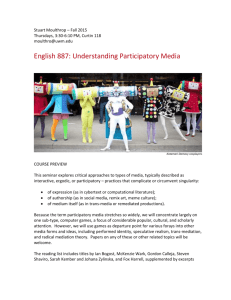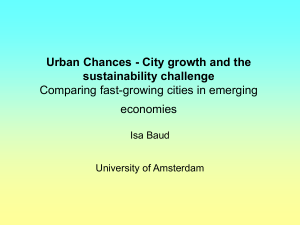Syllabus - University of Colorado Boulder
advertisement
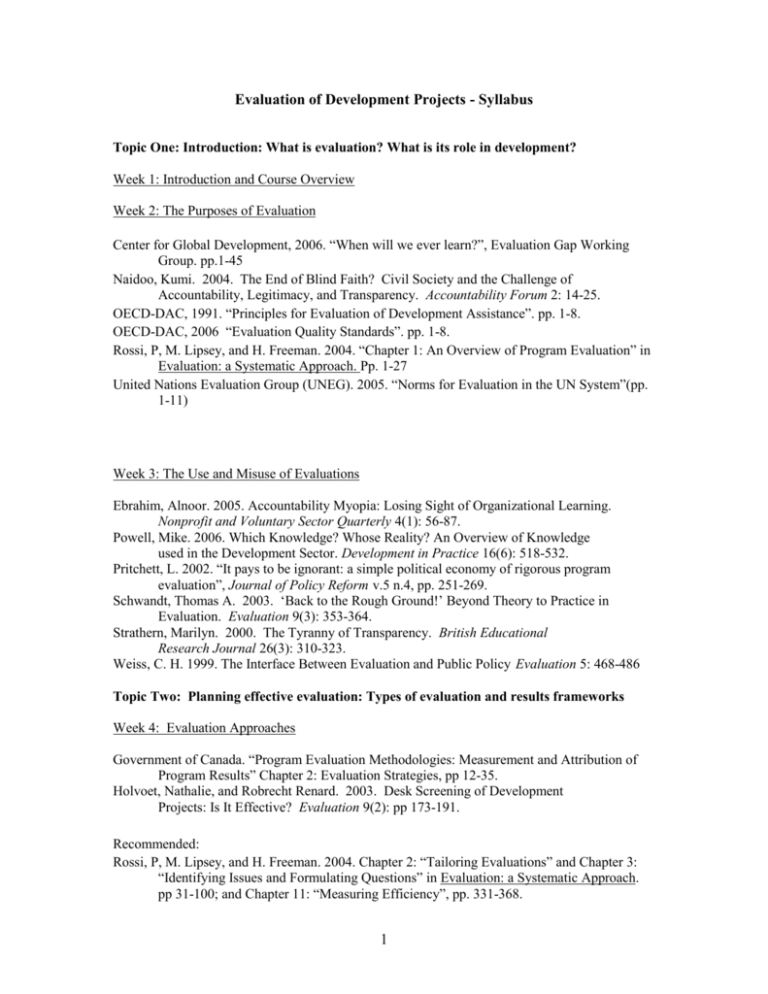
Evaluation of Development Projects - Syllabus Topic One: Introduction: What is evaluation? What is its role in development? Week 1: Introduction and Course Overview Week 2: The Purposes of Evaluation Center for Global Development, 2006. “When will we ever learn?”, Evaluation Gap Working Group. pp.1-45 Naidoo, Kumi. 2004. The End of Blind Faith? Civil Society and the Challenge of Accountability, Legitimacy, and Transparency. Accountability Forum 2: 14-25. OECD-DAC, 1991. “Principles for Evaluation of Development Assistance”. pp. 1-8. OECD-DAC, 2006 “Evaluation Quality Standards”. pp. 1-8. Rossi, P, M. Lipsey, and H. Freeman. 2004. “Chapter 1: An Overview of Program Evaluation” in Evaluation: a Systematic Approach. Pp. 1-27 United Nations Evaluation Group (UNEG). 2005. “Norms for Evaluation in the UN System”(pp. 1-11) Week 3: The Use and Misuse of Evaluations Ebrahim, Alnoor. 2005. Accountability Myopia: Losing Sight of Organizational Learning. Nonprofit and Voluntary Sector Quarterly 4(1): 56-87. Powell, Mike. 2006. Which Knowledge? Whose Reality? An Overview of Knowledge used in the Development Sector. Development in Practice 16(6): 518-532. Pritchett, L. 2002. “It pays to be ignorant: a simple political economy of rigorous program evaluation”, Journal of Policy Reform v.5 n.4, pp. 251-269. Schwandt, Thomas A. 2003. ‘Back to the Rough Ground!’ Beyond Theory to Practice in Evaluation. Evaluation 9(3): 353-364. Strathern, Marilyn. 2000. The Tyranny of Transparency. British Educational Research Journal 26(3): 310-323. Weiss, C. H. 1999. The Interface Between Evaluation and Public Policy Evaluation 5: 468-486 Topic Two: Planning effective evaluation: Types of evaluation and results frameworks Week 4: Evaluation Approaches Government of Canada. “Program Evaluation Methodologies: Measurement and Attribution of Program Results” Chapter 2: Evaluation Strategies, pp 12-35. Holvoet, Nathalie, and Robrecht Renard. 2003. Desk Screening of Development Projects: Is It Effective? Evaluation 9(2): pp 173-191. Recommended: Rossi, P, M. Lipsey, and H. Freeman. 2004. Chapter 2: “Tailoring Evaluations” and Chapter 3: “Identifying Issues and Formulating Questions” in Evaluation: a Systematic Approach. pp 31-100; and Chapter 11: “Measuring Efficiency”, pp. 331-368. 1 Ninan KN, Lakshmikanthamma S.. 2001. “Social cost-benefit analysis of a watershed development project in Karnataka, India.” Ambio. 2001 May;30 (3):157-61. Week 5: Results-Based Evaluation Framework CIDA. 2000. “Results-Based Management Handbook on Developing Results Chains”, pp. 2-30. Poole, Dennis, J. Davis, J. Reisman, Joan E. Nelson. 2001. “Improving the Quality of Outcome Evaluation Plans”. Nonprofit Management and Leadership 11(4): 405-421. W.K. Kellogg Foundation. Updated January 2004. Logic Model Development Guide: Using Logic Models to Bring Together Planning, Evaluation & Action. Battle Creek, Michigan. 72 pages. World Wildlife Fund, “Basic Guidance for Tools: Results Chains”, October 2005. pg 1-11. Case Study: Crawford, Paul, J. Perryman, and P. Petocz. 2004. Synthetic Indices: A Method for Evaluating Aid Project Effectiveness. Evaluation 10(2): 175-192 Week 6: Results Chains and Links to Monitoring Systems Presentations and discussion of students’ results chains (see Assignment #1Handout) Discussion on monitoring: Rossi, P, M. Lipsey, and H. Freeman. 2004. “Chapter 6: Assessing and Monitoring Program Performance “ in Evaluation: a Systematic Approach. Pp. 169 – 202. International Fund for Agricultural Development (IFAD). 2002. in Managing for Impact in Rural Development: A Guide for Project M &E. “Section 4: Setting up the M&E System” pp 41-21. Topic 3: Case Studies in Evaluations Week 7: Impact Evaluation (Part 1) Baker, Judy L. 2000. Evaluating the Impact of Development Projects on Poverty: A Handbook for Practitioners. Washington, D. C.: The World Bank. Chapters 1-2, pp. 1-39. Duflo, E. and M. Kremer. 2003“ Use of Randomization in the Evaluation of Development Effectiveness”, monograph pp. 2-32. Hulme, D. 2000. “Impact Assessment Methodologies for Microfinance: Theory, Experience and Better Practice’, World Development 28(1), 79-98. Roche, Chris. 2000. “Impact assessment: seeing the wood and the trees” Development in Practice, Volume 10, Numbers 3 & 4, pp 543-553. Case Studies: Duflo, E. P. Dupas, M. Kremer, and S. Sinei. 2006. “Education and HIV/AIDS Prevention: Evidence from a randomized evaluation in Western Kenya”. Department of Economics and Poverty Action Lab MIT. pp 2-23. Gaile, G. UGNADA MICROFINANCE 2 Morris, G and C. Barnes. 2005 “An Assessment of the Impact of Microfinance: A Case Study from Uganda” ESR Review: Journal of Microfinance Archives Vol. 7, No. 1; Summer 2005, pp1-14. Week 8: Impact Assessment (Part 2) / Participatory Monitoring and Evaluation (Part 1) Impact Assessment (Part 2) Case Study: Skoufias, E. “PROGRESA and its Impacts on the Welfare of Rural Households in Mexico, IFPRI, 2005. pp. 1-68. Participatory Monitoring and Evaluation (Part 1) Estrella, Marisol, and Jutta Blauert, Dindo Campilan, John Gaventa, Julian Gonsalves, Irene Guijt, Deb Johnson, Roger Ricafort. 2000. Learning From Change: Issues and experiences in participatory monitoring and evaluation. Ottawa: Institute of Development Studies. Chapter 1 pp. 1-15. Guijt, I., Arevalo, M. and K, Saladores, “Participatory Monitoring and Evaluation: Tracking Change Together” PLA Notes (1998), Issue 31, pp.28–36, IIED London. USAID. 1996. “Conducting a Participatory Evaluation”, 1996 #1 (PN-ABS-539). Pp. 1-4. Claus C. Rebien “Participatory Evaluation of Development Assistance: Dealing with Power and Facilitative Learning” Evaluation, Vol. 2, No. 2, 151-171 (1996) located in CYU Library at: HV41 .E915 v.2 1996. Week 9: Participatory Monitoring and Evaluation (Part 2) Chambers, R. and L. Mayoux. 2003. “Reversing the Paradigm: Quantification and Participatory Methods” monograph. pp 1-18. Gregory, A. 2000. Problematizing Participation: A Critical Review of Approaches to Participation in Evaluation Theory. Evaluation. Vol. 6, No. 2, 179-199 Case Studies: UNICEF. 2002. “Area-based development project Iran 1998-2000: Participatory Evaluation” Universities of Medical Sciences of the Provinces of Hormozgan, Kohgiluye-Boyer Ahmad, Kurdistan (Ministry of Health and Medical Education) and Centre for Sustainable Development and Environment (CENESTA). Pp 1-41. Mancini, F. “Comparative evaluation of participatory and conventional approaches to impact assessment- A SWOT analysis.” Paper presented at a CIGAR Impact Assessment Workshop, October 19-21, 2005 at CIMMYT Headquarters, Mexico. pp 1-12. Vernhooy, Ronnie, Sun Qiu and Xu Jinchu. 2006. The power of participatory monitoring and evaluation: Insights from south-west China. Development in Practice 16(5): 400-412. Week 10: Programmatic Evaluations (Complex Evaluations) 3 (Recommended) Greene, J. Caracelli V. and Graham W. ”Toward a Conceptual Framework for Mixed-Method Evaluation Designs “Educational Evaluation and Policy Analysis, Vol. 11, No. 3 (Autumn, 1989), pp. 255-274 Case Study: Rawlings, Sherburne-Benz and Van Domelen, 2004. Evaluating Social Funds: A Cross-Country Analysis of Community Investments. World Bank. Chapters 1, 2, 3, 7, 8, and 9. Choose one of the sectoral chapters (4, 5, 6). http://wbln0018.worldbank.org/HDNet/HDDocs.nsf/0/571667A87E3DBAD585256BB40 04EABEE?OpenDocument or order the book Week 11: Programmatic Evaluations (Complex Evaluations) Presentations and discussions of student critiques of evaluations (see Assignment #2 Handout) Week 12: Evaluating NGOs Ebrahim, Alnoor. 2003a. Accountability in Practice: Mechanisms for NGOs. World Development 31(5): 813-829. Easterling, Doug. 2000. Using Outcome Evaluation to Guide Grant Making: Theory, Reality, and Possibilities. Nonprofit and Voluntary Sector Quarterly 29(3): 482-486. Mebrahtu, Esther. 2002. Perceptions and practices of monitoring and evaluation: international NGO experiences in Ethiopia. Development in Practice 12(3&4): 501-517. Walsh, Eohgan and Helena Lenihan. 2006. Accountability and Effectiveness of NGOs: adapting business tools successfully. Development in Practice 16(5): 412-424. Case Studies: Feferman, Flavio. 2005. “Global Greengrants Fund Brazil Case Study”.pp.1-51. Harvey, P. and N. Marongwe. 2006 “Independent Evaluation of Oxfam GB Zambia’s Emergency Cash-Transfer Programme”. ODI. Pp. 6-44. Topic 4: Evaluation challenges Week 13: Evaluating Empowerment and Social Capital Case Studies: Cameron, John. 2006. A Participatory Approach to Evaluating the Impact of NGOs on Development in Nepal. Development in Practice 16(1): 91-96. Gibson and M. Woolcock. 2005. “Empowerment and Local Level Conflict Mediation in Indonesia: A Comparative Analysis of Concepts, Measures, and Project Efficacy”. World Bank. pp 1-30. Guirguis, C., K. Huda and S. Rahman. 2005. “Building Social Capital for the Ultra Poor: Challenges and Achievements.” CFPR-TUP Working Paper Series No. 6. BRAC, IDRC and the Aga Kan Foundation. pp. 1-18 Kabeer, N. 2001. “Conflicts Over Credit: Re-Evaluating the Empowerment Potential of Loans to Women in Rural Bangladesh”, World Development Vol. 29, No. 1, pp. 63-84, 2001 World Bank. 2006. “Thailand Social Capital Evaluation: A Mixed Methods Assessment of the Social Investment Fund’s Impact on Village Social Capital” World Bank. pp. 11-42. 4 Week 14: Evaluating Capacity Building and Advocacy Campaigns Chapman, J., (2002) Monitoring and evaluating advocacy. PLA Notes, 43: 48-52 Mayoux, L. 2002. “Advocacy for Poverty Eradication and Empowerment: Ways Forward for Advocacy Impact Assessment”. Monograph, pp 1-28. Wing, Kennard. 2004. “Assessing the effectiveness of capacity building initiatives: Seven issues for the field.” Nonprofit and Voluntary Sector Quarterly 33(1): 153-160. Case Studies: Bennett-Lartey, S., R. Vodouhe, and J. Watts. 2003. “Capacity Development in Ghana’s Plant Genetic Resources Centre: An Evaluation”. International Service for National Agricultural Research (ISNAR), the Netherlands. pp. 1-28. Nelson, P. 2000. “Heroism and ambiguity: NGO advocacy in international policy” Development in Practice, Volume 10, Issue 3 - 4 pp. 478 - 490 NORAD, 2004. “Study of the impact of the work of FORUT in Sri Lanka: Building Civil Society”, Evaluation/Study/5/2004, pp. 11-49 Topic 5: Final Projects Week 15: Presentation of Final Team Projects 5
